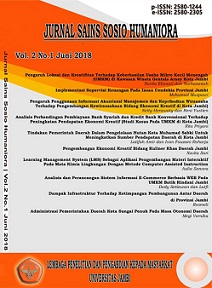Community Social Solidarity in Facing the Flash Flood Disasters in Sungai Limau Sub-District, Padang Pariaman Regency, West Sumatra
DOI:
https://doi.org/10.22437/jssh.v8i1.20261Keywords:
Flash Flood Disaster, Community, Social SolidarityAbstract
Flash flood disasters cause losses to society both in terms of material, non-material, and even psychological. Even though they are in a disaster-prone area, people continue to carry out their life activities as usual. The aim of this research is to analyze the building of community social solidarity in facing the flash flood disasters in Sungai Limau Sub-District, Padang Pariaman Regency. The theory used in this research is the theory of social solidarity emphasizing collective consciousness proposed by Emile Durkheim. The research was conducted in Sungai Limau District, Padang Pariaman Regency. This research uses qualitative research methods with descriptive research type. Informant withdrawal was carried out using a purposive sampling technique. The data collection method in this research began with non-participant observation, in-depth interviews, and document study. Data analysis using the Miles and Huberman model was carried out in several stages, namely, data collection, data reduction, data presentation and drawing conclusions. The results of the research show that the community in Sungai Limau sub-district, Padang Pariaman Regency remained resilient in the disaster area due to strengthening social solidarity between communities. This strengthening is built due to a sense of shared destiny, having goals to achieve together, and taking joint action in facing disasters. The conclusions in this research show that collective awareness is built in disaster areas driven by actions and goals to strengthen social solidarity.
Downloads
Downloads
Published
Issue
Section
License
Copyright (c) 2024 Indah Rahayu

This work is licensed under a Creative Commons Attribution-NonCommercial-ShareAlike 4.0 International License.
-
Copyright and other proprietary rights relating to the article, such as patent rights,
-
The right to use the substance of the article in own future works, including lectures and books,
-
The right to reproduce the article for own purposes,
-
The right to self-archive the article (please read out deposit policy),
-
The right to enter into separate, additional contractual arrangements for the non-exclusive distribution of the article's published version (e.g., post it to an institutional repository or publish it in a book), with an acknowledgment of its initial publication in this jurnal sains sosio humaniora.







